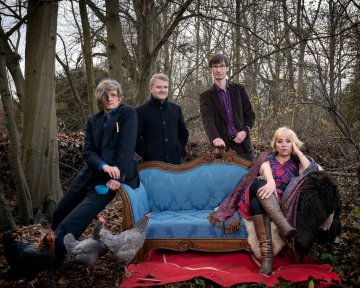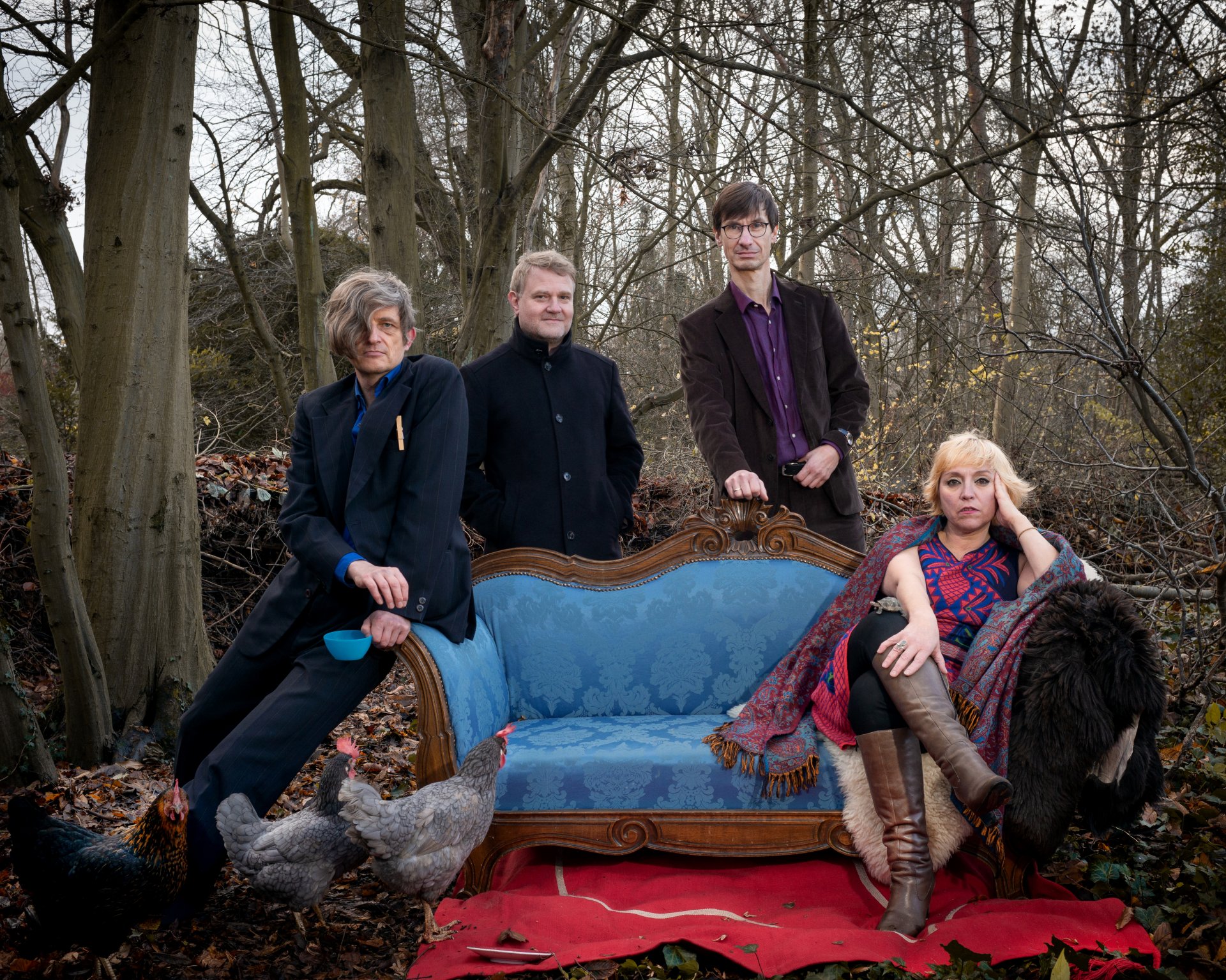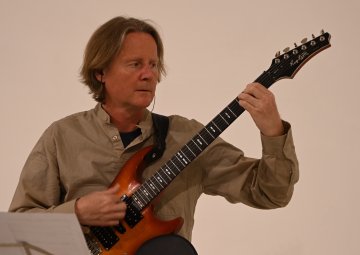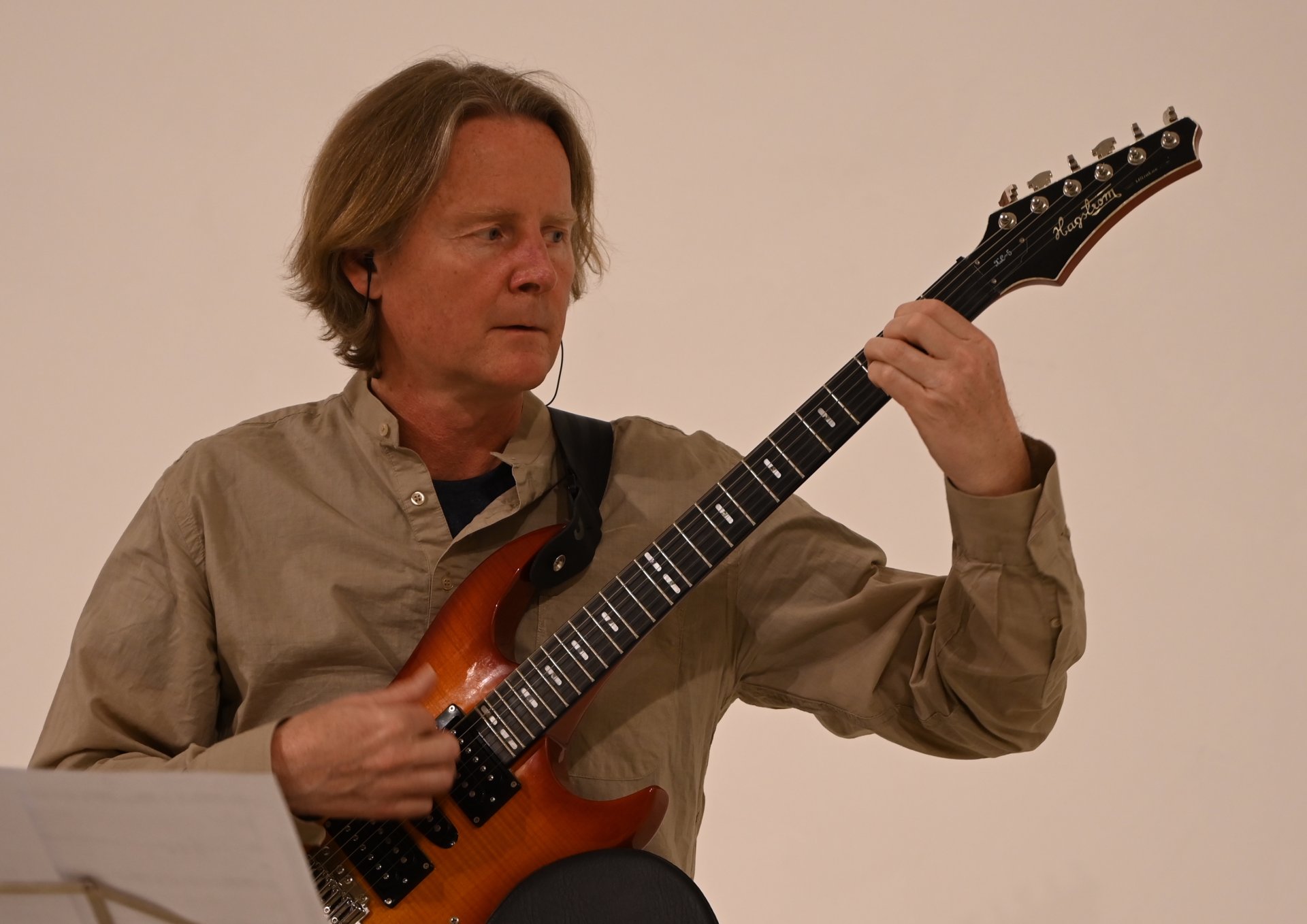
© Jens Röhm

Phill Niblock in memoriam
Wednesday, 15 January, 2025, 8pm
In January 2024, the US composer and intermedia artist Phill Niblock passed away at the age of 90. Niblock was a frequent guest at klubkatarakt, most recently in 2019, and was closely connected to the festival.
Known for his thick, loud drones of music, Niblock’s signature sound is filled with microtones of instrumental timbres that generate many other tones in the performance space.
For the opening, klubkatarakt is honouring this special artist with a large-scale, immersive concert in which his music and films will be presented in all three halls. In addition to the Dedalus Ensemble, long-time companions such as electronic musician Thomas Ankersmit (Berlin), violist Elisabeth Smalt and singer Alfrun Schmidt from Scordatura Ensemble (Amsterdam), pianist Ju-Ping Song (New York), flautist Erik Drescher (Berlin), Ensemble Nelly Boyd (Hamburg) and others will be performing.

© Gerome Blanchard

Dedalus
Ensemble in Residence 2025
Didier Aschour guitar, artistic direction
Amélie Berson flute
Pierre-Stéphane Meugé saxophone
Christian Pruvost trumpet
Thierry Madiot trombone
Silvia Tarozzi violin
Cyprien Busolini viola
Deborah Walker cello
Éric Chalan double bass
15 to 17 January, 2025, various times
Special guest as ensemble in residence at this year’s festival is Dedalus from Toulouse/France. Founded in 1996 by Didier Aschour, Dedalus is organized as a collective in which arrangements, orchestrations, and interpretations are developed collaboratively.
Their repertoire ranges from classics of minimalism to commissions from composers, and also includes recreations of works by unclassifiable artists.
Defying traditional categories, the ensemble performs conceptual and sensitive music that is radical and captivating, subtle and powerful.
Dedalus will play a total of four concerts and will also perform in the opening concert.

© Alex Schröder

Duo Scordatura – Elisabeth Smalt & Alfrun Schmid
Wednesday, 15 January, 2025, 8pm
The Amsterdam based Scordatura Ensemble grew initially from a trio project with musicologist and keyboard player Bob Gilmore (1961- 2015) to perform the works for intoning voice, Adapted Viola and Chromelodeon by the American maverick composer Harry Partch, for which the ensemble commissioned an exact copy of Partch’s Adapted Viola. Their concerts feature ‘classics’ from the worlds of microtonal and spectral music, together with new commissions, focussing on alternative tuning systems.
The original Trio Scordatura has played several performances with the American composer and filmmaker Phill Niblock, in collaboration with contemporary ensembles such as the Crash Ensemble from Ireland, the Klang ensemble from Holland and Nelly Boyd from Germany.

© Jann Wilken

Nelly Boyd
Wednesday, 15 January, 2025, 8pm
The composers’ collective Nelly Boyd emerged 2004 from the need to break up formal academic structures, to explore different influences from classical composition, electro-acoustic music, rock, improvisation etc. and to search for its own sound – all of this in a non-hierarchical framework.
Since 2006, Nelly Boyd has worked closely with Phill Niblock for almost two decades, performing numerous concerts, premieres and first performances by, for and with the composer. This collaboration is also documented in various CD and DVD recordings.

© Matthias Meyer

Matthias Meyer
Wednesday, 15 January, 2025, 10pm
Matthias Meyer (Hamburg) is a visual artist and filmmaker and is interested in music. He has been buying records for forty years and sometimes he even plays them.
Wed, Jan 15th 2025
Opening
For Phill Niblock
8pm
Audiovisual Concert Installation
Phill Niblock
Compositions:
Guitar too, for four (1996)
for electric guitars
Hurdy Hurry (1999)
for hurdy gurdy
Two Lips (2011)
for ensemble
One Large Rose (2008)
for violin, cello, piano, bass guitar
DreGliss (2015)
for glissando flute
Vlada BC (2013)
for viola
Surge (2013)
for serge modular synthesizer
Three Petals (2013)
for three ensembles
commissioned by klubkatarakt 2014
Films
from the series
The Movement of
People Working
with:
Dedalus
Didier Aschour guitar, artistic direction
Amélie Berson flute
Pierre-Stéphane Meugé saxophone
Christian Pruvost trumpet
Thierry Madiot trombone
Silvia Tarozzi violin
Cyprien Busolini viola
Deborah Walker cello
Éric Chalan double bass
Duo Scordatura
Alfrun Schmid
voice, hurdy gurdy
Elisabeth Smalt
viola d’amore
Ju-Ping Song piano
Thomas Ankersmit
serge modular synthesizer
Erik Drescher
flute, glissando flute
Chad Kinsey
electric guitar
Nelly Boyd
Robert Engelbrecht
cello, electric guitar
Jan Feddersen
piano, electric guitar
Johann Popp electric guitar
as guest:
Julia Berg bass guitar
Dedalus
Scordatura
Ju-Ping Song
Thomas Ankersmit
Erik Drescher
Chad Kinsey
Nelly Boyd
10pm
Matthias Meyer
Matthias Meyer

© GMEA-CNCM Albi

Dedalus
Ensemble in Residence 2025
Didier Aschour guitar, artistic direction
Amélie Berson flute
Pierre-Stéphane Meugé saxophone
Christian Pruvost trumpet
Thierry Madiot trombone
Silvia Tarozzi violin
Cyprien Busolini viola
Deborah Walker cello
Éric Chalan double bass
Benjamin Maumus sound
Thursday, 16 January, 2025, 7:30pm and 10pm
On the second day, Dedalus will first present the German premiere of Histoire sentimentale des intervalles by the Italian composer Alessandro Bosetti (* 1973). The piece creates harmonic universes from ‘found’ sound
material through free or synaesthetic associations by the musicians.
Bosetti has a particular interest in the musicality of language and in the voice, conceived as an autonomous object and an instrument of expression. His works enacts a dialogue between language, voice and sound within complex tonal and formal constructions.
In the night concert, Ensemble Dedalus will perform a programme of works by the English musician, producer, visual
artist and theorist Brian Eno (* 1948). He has been described as one of popular music’s most influential and innovative
figures. In the mid-1970s, he laid the foundations for a new musical genre between avant-garde and pop, Ambient Music.
Dedalus will present instrumental arrangements of Discreet Music and other Ambient pieces by the British experimentalist.

© Jean Christophe Lett

Alessandro Bosetti: Histoire sentimentale des intervalles (2024)
Thursday, 16 January, 2025, 7:30pm
Questioning seven musicians from the Dedalus ensemble about their relationship with intervals, Alessandro Bosetti asks each of them to sing four notes. On the ensuing harmonic chart, he composes a “Sentimental History of Intervals” for seven instruments, which explores a geography of musical pitches through microtonal writing and meticulous tuning work.
The piece is built around the relationships between subjectivity, memory and harmony through free or synaesthetic associations. It traces the emotional stratifications, memories and idiosyncrasies that constitute the collective ear and musical sensitivity of a musical ensemble.

© Sanja Bistric

Thomas Ankersmit: Solo Serge Modular Performance
Thursday, 16 January, 2025, 9pm
Thomas Ankersmit plays the Serge Modular analog synthesizer, which celebrated its 50th anniversary last year.
Inspired equally by musique concrète and more recent electroacoustic improvisation, he aims to create a grittier and more fractured soundworld than commonly heard on modular synthesizers.
Ankersmit uses entirely “pure” Serge Modular signals, with no other sound sources or effects, trying to create an almost tactile, “graspable” sound. A music that is tuned – quite literally – to the resonances of the performance space.

© Jann Wilken

Long Night
Saturday, 18 January, 2025, 8pm – …
The Long Night did not grow out of the festival alone, but from a concert form developed by the composers‘ collective katarakt back in the 1990s. The concept is simple, but holds new surprises every year, as the festival primarily presents first and world premieres by the local and audiovisual performances.

© Gunnar Lettow

Gregory Büttner: Surfing Surfaces (2023)
Composition for two rotating fans, objects and prerecorded sounds
Saturday, 18 January, 2025
Various plastic packaging (yoghurt pots, boxes of chocolates) are held with one corner on the rotating flat center surface of the fans so that complex grinding noises or rubbing sounds are produced. These sounds are additionally modulated with acoustic resonators (paper cups, tin cans). Sometimes there is a playback of various sine tones and pre-recorded, partially processed rubbing sounds.
Thu, Jan 16th 2025
7:30pm
Dedalus I
Alessandro Bosetti
Histoire sentimentale des intervalles (2024) DEA
Dedalus
Didier Aschour
guitar, artistic direction
Amélie Berson
flute and keyboard
Cyprien Busolini viola
Éric Chalan double bass
Thierry Madiot bass trombone
Christian Pruvost trumpet
Deborah Walker cello
Benjamin Maumus sound
9pm
Thomas Ankersmit
Solo Serge Modular Performance
Thomas Ankersmit
10pm
Dedalus II – LOOPING
Brian Eno
Thursday Afternoon (1985)
Discreet Music (1975)
Dedalus
Didier Aschour guitar, artistic direction
Amélie Berson flute
Pierre-Stéphane Meugé saxophone
Christian Pruvost trumpet
Thierry Madiot trombone
Silvia Tarozzi violin
Cyprien Busolini viola
Deborah Walker cello
Éric Chalan double bass
Benjamin Maumus sound

© Laurence Prat

Pascale Criton
Friday, 17 January, 2025, 6pm and 7:30pm
Since the 1980s the French composer Pascale Criton has been researching sound variability, microtones, multisensory reception and the spatialization of listening. In her compositions, Criton combines microtonal and diatonically tuned instruments with electronics. Her compositional approach consists of going beyond the natural discontinuity of diatonic scales by working with very dense microtonal scales. The state of continuity she strives for is related to these scales consisting of very fine micro-intervals. The interval of two or three sixteenth tones is very small and is hardly perceived by the ear, but it influences the perception of timbre, rhythm and sense of time.
Following a presentation in collaboration with the Verband für aktuelle Musik Hamburg, Pascale Criton will present a selection of her compositions for the first time in Hamburg together with Dedalus. klubkatarakt has commissioned a new piece from her, which will be premiered at the concert.

© GMEA - CNCM Albi-Tarn

Dedalus
Ensemble in Residence 2025
Friday, 17 January, 2025, 7:30pm and 10pm
Dedalus opens the third day of the festival with a portrait of Pascale Criton. Born in 1954, the French composer has been researching sound variability, microtones, multisensory reception and the spatialization of listening.
In the night concert, Dedalus will play Occam Hepta I by Éliane Radigue, which was written for the ensemble. Radigue (* 1932), one of the most important pioneers of electronic music, writes long, gradual sound progressions with a feel for finest nuances in her instrumental music.
The second piece played by the ensemble is Overlays – AtmospheresTransparent/Opaque by the American composer
Catherine Lamb (* 1982). This work was also written especially for the ensemble. Lamb belongs to a younger generation of composers who deal with the interaction of sounds, acoustic phenomena, just intonation, etc.

© Brian Donnelly

Ju-Ping Song
Friday, 17 and Saturday 18 January, 2025
Surprisingly, we can present a solo piano performance by the US-American pianist Ju-Ping Song on this evening. Song is internationally recognized as one of today’s masters of contemporary music. Among others she will play Techno Etudes by Karen Tanaka in this program.

© Rui Camilo

Catherine Lamb: Overlays – Atmospheres Transparent/Opaque (2013)
Friday, 17 January, 2025, 10pm
Catherine Lamb is interested in the physical interactions between sounds that musicians arrange in harmonic space, in search of a form of “sacred realism”. She is one of the most celebrated and sought-after composers of her generation. Her works have been commissioned by leading new music ensembles such as the JACK Quartet, Yarn/Wire, Dedalus and Ensemble Musikfabrik.

© Shervin Lainez

Molly Joyce: Rave (2015) & Electricity (2020)
Samstag, 18.1.2025
Molly Joyce was born in 1992 in Pittsburgh. She started her instrumental music education on the violin. After a car accident permanently damaged her left hand at the age of 7, she began playing the cello by using her left hand for the bow and right hand on the fingerboard. She also learned to play the trumpet and began composing on the computer.
Joyce has studied with Samuel Adler, Martin Bresnick, Guus Janssen, David Lang, Han Lash, Missy Mazzoli, Martijn Padding, Christopher Rouse, and Christopher Theofanidis.
Rave will be played by pianist Ju-Ping Song. The composition is part of Song’s first solo album Monad, which was released in December 2024. Electricity is performed by guitarist Chad Kinsey.

© Alena Carlsson

Raspe
Sunday, 1, January 2025, 1:00am
Raspe is a Hamburg-based DJ who‘ll present an eclectic selection of records creating a wonky, stoical and obscure sound from different spheres.
Fri, Jan 17th 2025
6pm
Presentation
Pascale Criton
In cooperation with
Verband für aktuelle Musik Hamburg
vamh
7:30pm
Dedalus III –
Portrait Pascale Criton
Pascale Criton
Bothsways (2015) FP
for violin and cello
Process (2013) FP
for ensemble
Steppings (2013) FP
for ensemble
Streams (2024) WP
for ensemble
commissioned by klubkatarakt
Pascale Criton &
Deborah Walker
Chaoscaccia (2014) FP
for cello solo
Dedalus
Didier Aschour
guitar, artistic direction
Amélie Berson flute
Thierry Madiot trombone
Silvia Tarozzi violin
Deborah Walker cello
Benjamin Maumus sound
9pm
Ju-Ping Song
Solo Piano
Karen Tanaka
Techno Etudes I (2000) FP
Techno Etudes II (2020) FP
Jan Feddersen
piano and e-bows (2011)
10pm
Dedalus IV
Éliane Radigue
Hepta 1 (2017) GP
Catherine Lamb
Overlays – Atmospheres Transparent/Opaque (2013) FP
Dedalus
Didier Aschour guitar, artistic direction
Amélie Berson flute
Pierre-Stéphane Meugé saxophone
Christian Pruvost trumpet
Thierry Madiot trombone
Silvia Tarozzi violin
Cyprien Busolini viola
Deborah Walker cello
Benjamin Maumus sound

© Zlatko Micic

Svetlana Maraš
Saturday, 18 January, 2025
Special guest of the Long Night 2025 will be the Serbian electronic musician and composer Svetlana Maraš. Maraš works at the intersection of experimental music, sound art and new media. She describes her music as “complex and dense musical structures and forms without exact repetitions.”. Rather a continuously changing sound over the course of time.

© Przygodda

Pit Przygodda: An audiovisual Essay on the Moon
Pit Przygodda Silhouette Synthesizer
Saturday, 18 January, 2025
Inspired by the technology of light-sound, which was recorded on old cinema films as a wave track next to the picture windows, artist musician Pit Przygodda has been looking for a visual introduction to the audio wave itself since the early 1990s: He wanted to create audio wave forms by moving his hand-silhouette, which then become sound at the same moment.
Through various experimental films, the search led to the self-invented Silhouette Synthesizer, which he has been building and selling since 2021. The instrument brings with it an as yet unknown multimedia-narrative language that is still completely new in its expression and dramaturgy.

© Gitbi Kwon

Jiwon Sim: Blomstgrit [OE blōstm + grit] (2024)
for one percussionist & live electronics with sensor
Saturday, 18 January, 2025
flowers on the small, loose particles of stone or sand.
The pitch of the sound that came into the microphone was adjusted using a sensor. The possibility of sound of percussion instruments was explored, and it is a concern about sound expansion.


Kris Kuldkepp: Music for Tropical Storms (2024)
for modular synthesizer and objects
Kris Kuldkepp (EE) is a sound and performance artist based in Hamburg, Germany. Her work explores the perception, materiality, and behavior of sound and its resonance in physical and/or mental spaces. Additionally, her work embodies the philosophy of and strives towards non-authoritarian musical forms and spaces that balance between meaning and noise.

© Oliver Schneller

Philipp Krebs: Abfertigung, Etüden für E-Gitarre und Elektronik (2019/2021)
Saturday, 18 January, 2025
Composer Philipp Krebs (* 1994) engages himself with current trends dealing with the design of sound in the media of the pop cultural mainstream and examines how different art forms operating with sound influence each other across genres.
Gisbert Watty plays guitar: classical and electric. He is especially engaged in chamber music and contemporary music. Concert tours have taken him all over Europe and Australia with his permanent ensembles. Collaborations with and premieres of composers from all over the world.


Okapi
Sascha Demand electric guitar
John Eckhardt double bass
Tobi Gronau sound table
René Huthwelker synthesize
Saturday, 18 January, 2025
Four sound researchers – each equally a composer and instrumentalist – understand their own music as “okapi”: textures, figures, structures, forms. The quartet’s body of sound is already an organism of sound and color.
And so the band’s productions are originally created in a kind of pure contemplation of the sound apparatus itself.
““The beauty of Okapi is the highly improbable soundscapes that automatically emerge every time we play together.”
Meister Eckhardt

© unbekannt

Die Dicke Trompete
Hamburg’s free improvising Lad*ies Orchestra
Saturday, 18 January, 2025
Since 2019, Krischa Weber and Georgia Hoppe have each invited three female colleagues to the small stage of the Hafenbahnhof as part of the blurred edges festival. After five charming, witty, diversely orchestrated concerts, the time was ripe to bring together all the musicians involved so far in a great sound spectacle.
After a brilliant “Grande Soirée” in the Christianskirche Ottensen in September 2024, Hamburg’s freely improvising Lad*ies Orchestra presents itself for the second time at the end of klubkatarakt 2025.
Sat, Jan 18th 2025
LONG NIGHT
New compositions by the
katarakt-network
Shortfilm program in
cooperation with the
Kurzfilm Agentur Hamburg
shortfilm
8pm
Set 1
Pit Przygodda
An audiovisual Essay on the Moon (2025) WP
Pit Przygodda
Silhouette Synthesizer
Pit Przygodda
Molly Joyce
Electricity (2020) GP
for electric guitar and distortion
Chad Kinsey electric guitar
Molly Joyce
Chad Kinsey
Michael Lyons
Katagami (2016)
Shortfilm
Michael Lyons
Jiwon Sim
Blomstgrit
[OE blōstm + grit] (2024)
for one percussionist & live electronics with sensor
Oscar Tudge percussion
Jiwon Sim electronics
Jiwon Sim
Tina Frank
Schlimmige Kreise –
Input : Reason (2023)
Shortfilm
Tina Frank
9pm
Set 2
Philipp Krebs
Abfertigung (2019/2021)
Etudes for electric guitar and electronics
Gisbert Watty electric guitar
Frauke Aulbert sound
Philipp Krebs
Gisbert Watty
Frauke Aulbert
Siegfried A. Fruhauf
Mare Imbrium (2024)
Shortfilm
Siegfried A. Fruhauf
Gregory Büttner
Surfing Surfaces (2023/25) WP
for two rotating fans, objects and prerecorded sounds
Gregory Büttner performance
Gregory Büttner
Karin Fisslthaler
Sie puppt mit Puppen (2024)
Shortfilm
Karin Fisslthaler
approx. 10pm
Set 3
Svetlana Maraš
Live Performance (2025) FP
Svetlana Maraš electronics
Svetlana Maraš
approx. 11pm
Set 4
Billy Roisz
Happy Doom (2022)
Shortfilm
Billy Roisz
Molly Joyce
Rave (2015) GP
for piano and pre-recorded electronics
Ju-Ping Song piano
Molly Joyce
Ju-Ping Song
Phill Niblock
Max (1967)
Shortfilm
Phill Niblock
Okapi
chamber music contemplation (2025) WP
Sascha Demand
electric guitar
John Eckhardt double bass
Tobias Gronau sound table
René Huthwelker synthesizer
approx. 12:10am
Set 5
Kris Kuldkepp
Music for Tropical Storms (2024)
for modular synthesizer,
no-input mixer and
amplified objects
Kris Kuldkepp
synthesizer, mixer, objects
Kris Kuldkepp
Michael E. Haase
Hacken (2022)
Shortfilm
Die Dicke Trompete
Anne Wiemann flutes, bariton sax
Annette Kayser percussion
Nicola Kruse violin
Moxi Beidenegl voice
Corinna Eikmeier cello
Ewelina Nowicka violin
Louise Stauske trumpet
Daria Iossifova toy piano, melodica
Mizuki Wildenhahn dance
Ayse Glass Theremin voice
Tam Thi Pham dan bao
Katrin Bethge light projection
Krischa Weber
cello, singing saw, concept
Georgia Hoppe
saxophone, clarinets, concept
1am
Raspe




























































